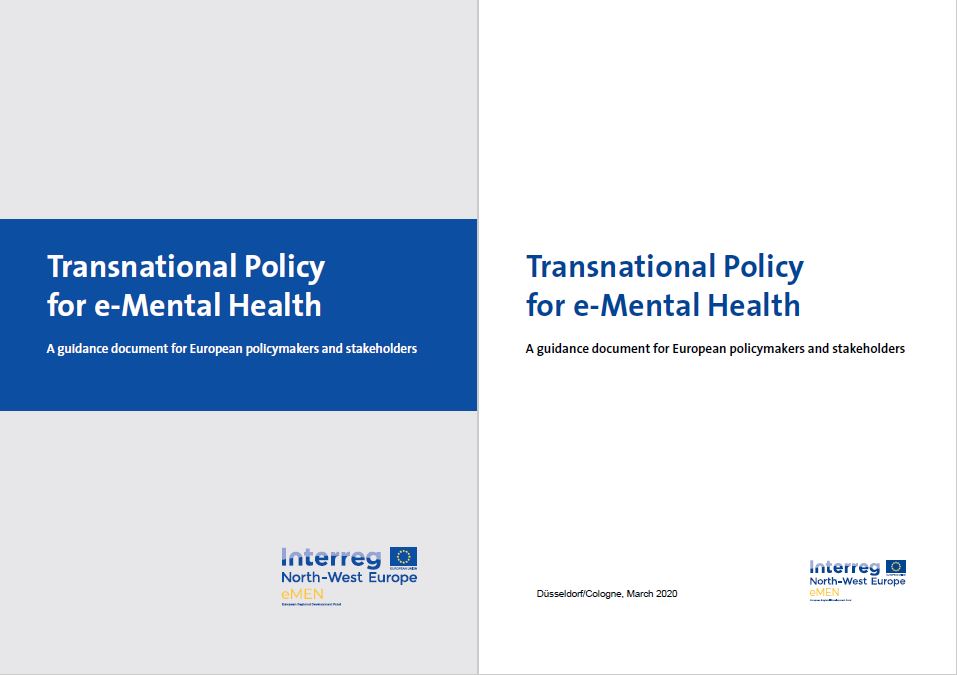It is time to place e-mental health (eMH) at the heart of national and European health strategies and policies to facilitate a structured approach for eMH implementation. This holds true in particular in times of global crisis like the present Covid-19 pandemic with physical distancing, societal lock-down, economic break-down, and psychosocial derangement.
Mental health systems need a balanced combination of guidance, regulation, legislation and education, plus awareness campaigns to ensure that the use of safe, effective and high-quality eMH products and services is promoted to benefit the (mental) health of all European citizens. More attention should be given to sensitising the public, developing needs-tailored approaches for specific target groups, improving training for the mental health workforce, and developing guidelines and transparent information about eMH products and services.
More research is needed to identify how European citizens may effectively benefit from eMH in all its varieties, including efficacy, cost-effectiveness and implementation strategies. To achieve these goals, the engagement of all stakeholders (health professionals, developers, users, and policy makers) is required.
The Transnational Policy for e-Mental Health – A guidance document for European policymakers and stakeholders was developed as part of the eMEN project (lead: Oyono Vlijter) eMEN (e-mental health innovation and transnational implementation platform North-West Europe) is a six-country project aiming to increase the implementation of high-quality eMH.
In the past 4 years many of the eMH implementation conditions mentioned above have been addressed by the eMEN project. eMEN was funded by the European Regional Development Fund within the funding area Interreg North-West Europe, and became active in May 2016 (www.nweurope.eu/emen). Within eMEN, the project partners from Belgium, France, Germany, Ireland, the Netherlands and the United Kingdom carry out a unique combination of activities in research, product development, policy guidance development and communications, and initiate a transnational cooperation platform for eMH stakeholders.
The Transnational Policy helps to explain the benefits of eMH products and services and their impact on improving population-level mental health throughout Europe. It outlines the challenges that are yet to be overcome in order to facilitate the implementation and adoption of eMH solutions, and provides a practical guide to achieve these goals.
Capitalisation phase
Beginning in June 2020, the eMEN project will continue its work within a Capitalisation phase of funding, which will focus on further scaling the implementation of eMH. The Transnational Policy will be introduced to stakeholders at the European and at the national policymaking level in 28 knowledge exchange sessions. Each project partner will organise at least five meetings within their own country, three further meetings will take place at EU-level. The sessions are meant to promote, discuss, and implement the content of the Transnational Policy.
An originally planned launch meeting in Brussels had to be postponed due to the Covid-19 pandemic. Instead, a draft of the Policy was already presented to representatives in Brussels of the EC Directorate-General for Health and Food Safety, the document was sent to the new EU health commissioner, to the WHO (HQ Dept. of Mental Health and Substance Abuse, and the Regional Office Europe), to EPA and WPA (European and World Psychiatric Association) - with generally receiving very positive response. Other European and national organisations and stakeholders are being planned for provision of the document. Now, with the launch of the document on the eMEN website, we would appreciate receiving also your feedback on the document and we would be available for discussion, consultation, collaboration and support of your eMH implementation plans and activities.
(contact: o.vlijter@arq.org; wolfgang.gaebel@lvr.de).
Editorial responsibility of the Transnational Policy for e-Mental Health
On behalf of the eMEN Consortium (details see document), the Transnational Policy was coordinated, directed and written by:
Wolfgang Gaebel (lead: WP Policy), Nadine Trost, Sandra Diekmann, Rabea Lukies and Jürgen Zielasek.

